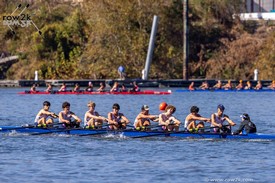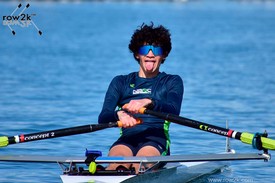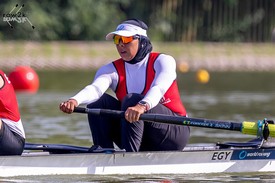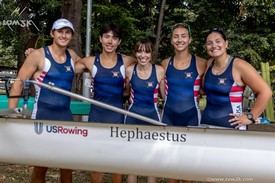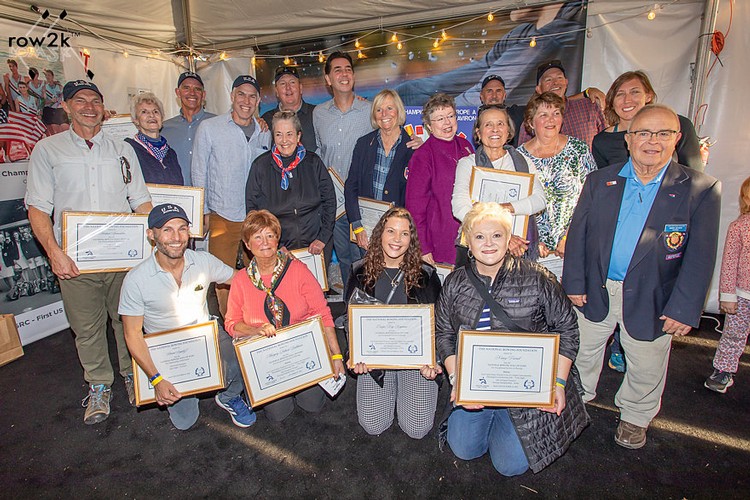
The National Rowing Foundation Hall of Fame inductions took place at the NRF tent at the Head Of The Charles two weeks ago; following are NRF Hall of Fame committee member Bill Miller’s introductions of each of the inductees.
See photos from the ceremony in our HOCR galleries starting here.
Comments from The Class of 2022 National Rowing Hall of Fame® Induction Ceremony, by Bill Miller – October 22, 2022:
2008 Olympic Women’s Single Silver Medalist: Michelle Guerette & her coach, Charley Butt
Michelle arrived in Cambridge from Bristol CT in 1998. She walked into the Weld boathouse with no experience and met Liz O’Leary. From that moment, it was full steam ahead.
Michelle’s Olympic dreams began when she attended the 2000 Development Camp after her sophomore year. She mentions, “It was a fun experience training with national team members”. She rowed in the four at the Nations Cup that summer. In 2001, after her junior year, she rowed in the W4 at the Lucerne World Championships placing 4th.
After graduating from Harvard, she continued to capture spots on the US teams. In 2002 she was an alternate. In 2003 she earned a seat in the W8 and placed 5th.
Then in 2004 at the Athens Olympics, Michelle sculled in the US Women’s Quad where her boat placed 5th.
After the 2004 Olympics, Michelle switched to the single where she worked with Charley Butt. She says, “Coming off the 2004 Olympics, I needed to back off and Charley was great. He encouraged me to get on the water in the single and with no pressure, just scull relaxed”.
She trained with others on the Charles from Riverside and Cambridge Boat Clubs. “It was such an enjoyable experience. It felt like a team effort,” she comments.
Charley Butt describes how Michelle was a natural for the single. “She’s an extraordinary athlete, had incredible power and a great feel for the water. She showed tremendous potential and made a huge commitment”.
For the off-season of 2006, Charley set it up for Michelle to train on Lake Karapiro in New Zealand. “It was a great experience to train with the New Zealanders”, she says.
Racing in the single in 2005, 6, & 7, she obtained valuable racing experience. Her campaign at the Worlds those three years showed she belonged in the single: 2005 - 3rd, 2006 - 5th and 2007 - 3rd again.
Leading up to the Beijing Olympics she focused on her training. Charley explains, “She was determined to make it work. She had incredible speed at a low cadence.” Michelle says, “My approach was to work hard and make it fun.”
Charley continues, “In Beijing she was incredibly focused. Pressure didn’t affect her at all. I was impressed by how calm she was as the A Final approached.“
She knew the competition very well since she had raced against the top finalists for three years. Her plan was to focus on the competitor that had the steadiest speed over the 2000 meters. It was three-time World Champion Ekaternia Karsten from Belarus. Michelle wanted to shadow her.
Off the start, the Czech sculler darted into the lead, followed by Bulgaria, then Karsten and Michelle. At the 1000, it was still the Czech leading, the Bulgarian moved into 2nd, Karsten followed in 3rd and China charged into 4th ahead of Michelle. Now it was time to move.
Michelle explains, “I felt good and stayed comfortable.”
She knew before she reached the last 500 that she needed to go. She bore down, Bugaria moved into 1st with Karsten moving into 2nd and Michelle moving quickly, passing China and the Czech scullers. Screaming through the last 500, Michelle charged through the World Champion, Karsten. Michelle took 3-1/2 seconds from her in that last 500 and moved up on Bulgaria. At the finish line Bulgaria held on to win but by only .44 seconds, Michelle was second - a great race plan from a great racer.
Ladies & Gentlemen – I present to you for induction into the National Rowing Hall of Fame: 2008 Olympic Silver Medalist, Michelle Guerette & Coach Charley Butt.

The 1994 World Champion Men’s Eight
To get a feel for the results of the 1994 Men’s Eight, we need to take a look at the 1993 Eight. Mike Spracklen took over coaching the men’s program in 1993. The guys were young and no one had US Team experience so it was an eye opening experience for all. The Men’s Eight placed a good 3rd at the World Championships.
So in 1994, Coach Spracklen informed the group with aspirations to make the eight, they would relocate to San Diego and the training would consist of three-a-day workouts. Full time jobs probably wouldn’t work. Training now became their full-time job.
The USOC training facility hadn’t been built. Housing and meals were at the Naval Station and they rowed out of a shipping container. “These were sparse accommodations,” reports coxswain Steven Segaloff. Coach Spracklen notes, “They adapted very quickly to a program that was very different for them, moving from their home environment to train together as a team and to work much harder than they had experienced before.”
From the 1993 Eight, four rowers and coxswain carried over into the 1994 crew. They were Jamie Koven, Fred Honebein, Jon Brown, Don Smith and Steven Segaloff. The other four seats were filled with former US Team veterans. These were Sean Hall, Chip McKibben, Bob Kaehler and Jeff Klepacki.
After months of training by themselves in San Diego, they were off to Europe to gain racing experience. Their first stop was Duisburg. The format was a 500m sprint then a 1,000 meter race. Steven recounts, “ Day 1 we were edged by Germany. The next day we beat Germany but Romania won. Both days were close results and a good battle.”
Next was the Henley Royal Regatta. In the semi-final they took on the highly rated Dutch crew. In a good race the US Men’s Eight knocked them out of the regatta while setting course records for the Barrier and Fawley. The Barrier record stood for over twenty years. Their margin over the Dutch was two lengths. Then in the final they polished off the French Eight with a verdict of “Easily”.
Next stop was Lucerne Switzerland. But between Henley and Lucerne they experienced a tragic event. Jeff Klepacki’s father suddenly died. Steven states, “This brought our crew together even more and became a rallying point”.
At Lucerne they stuck close to the German eight and placed second by 6/10ths of a second.
Steven continues, “In early August, we raced at the Goodwill Games in St. Petersburg, Russia. There was a 500 meter sprint where we came in 3rd behind Germany and Russia and then a 1,000 meter race which we won.”
Now it was the World Championships on their home water in Indianapolis. After racing the best European eights, they came back with confidence. In the final they took control of the race in the first 1,000 meters and, surprisingly, the feared German boat was well off the pace. Now it was up to the Dutch and Romanians to take it away from the US, but it wouldn’t happen. First: USA, 2nd the Netherlands and 3rd Romania. The US Men’s Eight became World Champions and set a new 2000-meter World Record.
Steven says, “Since Indianapolis, the crew has been very tight and we gather regularly. We call ourselves the Diesel Boat Club.”
Coach Mike Spracklen comments, “The thing that comes to my mind about the guys is the friendship they have shown and continue to show after all these years.” He continues, “On hearing of my wife, Annie’s, health deterioration, one day a bunch of them flew to the UK to see us. The next day they bought and decorated a Christmas tree. And then the following day flew back to the States. There aren’t many people in this World who would do that.”
Ladies & Gentlemen - I present to you for induction into the National Rowing Hall of Fame: The 1994 World Champion Men’s 8 (aka the Diesel Boat Club):
Bow Sean Hall
2 Fred Honebein
3 Chip McKibben
4 Bob Kaehler
5 Don Smith
6 Jonathan Brown
7 Jamie Koven
8 Jeff Klepacki
Cox Steven Segaloff
Coach Michael Spracklen and accepting for Mike is his son Adrian

Patron - Michael J. Meehan
PATRONS are people who have made a difference, a big difference in rowing. People who have Given Back at a level well above what would be expected. Sometimes making a difference by financially contributing to the health of rowing. Or perhaps by dedicating huge blocks of time to manage programs or referee regattas so that rowing could thrive and benefit the competitors. Perhaps it’s by changing or influencing the course of rowing in the US.
We induct Patron - Michael J. Meehan... also known as Mungo.
Mike Meehan’s dedication to rowing spans over five decades of Giving Back big time.

After graduating from U Penn, in 1963, Mungo was approached by his legendary coach, Joe Burk, and asked to head up the Friends of U Penn Rowing. Mungo says it was a “thrill, the greatest honor of my life”. Joe was like a god to Mungo and many others. And Mungo is still active with Friends of U Penn rowing.
Following graduation, Mungo headed to Wall Street. With success there, he began Paying Back. And he was able to tap into his other rowing buddies on Wall Street. Mungo is the definition of Giving Back and he never attached strings to his donations. Jamie Koven says, “He always wanted the donations to be used where it was best needed ”.
Mungo has been president of the National Rowing Foundation for decades. He emphasized that the NRF should be inclusive. He added women and lightweights to the Board of Directors. He worked diligently to make sure women’s rowing and lightweight rowing would be fairly treated.
In the late 1970s he co-founded the Power Ten New York Inc. with the late Frank Shields and has been very involved ever since.
He never gave up the oar, racing in masters’ events, “until aching bones left him on the embankments”.
Ladies & Gentlemen – I present to you for induction into the National Rowing Hall of Fame: Patron Extraordinaire – Michael ‘Mungo’ J. Meehan
Patrons - The 1967 Philadelphia Girls Rowing Club
I mentioned that Patrons are people that changed or influenced the course of rowing.
Fifty-five years ago, a group of women from the Philadelphia Girls Rowing Club became the first US Women’s Team and competed at the FISA European Championships in Vichy France. Today we take for granted that when a women’s crew earns a spot on the Team, the next step is to get uniforms and plane tickets. In 1967 it wasn’t so easy.
The National Association of Amateur Oarsmen was in charge of selecting and authorizing US boats to compete at FISA regattas. Up to 1967 the NAAO was singularly focused on men’s rowing. In 1962, women’s clubs formed the National Women’s Rowing Association to act for women’s rowing as the NAAO had been doing for men’s rowing for almost 100 years. The NWRA organized and conducted the Women’s National Rowing Championships.
At the 1967 Women’s Championships, the eight was won by PGRC. They asked themselves, “Why don’t we compete at the European Championships?” FISA required that the NAAO authorize all US entries. Well, the NAAO never thought about endorsing a women’s crew. The brass didn’t warm up to the idea.
But the PGRC women didn’t take no for an answer. With persistence, pressure and having their coach, NAAO Treasurer Ernest Bayer, on their side, the NAAO finally gave in and approved their entry. They would be the first US Women’s Team.
Who would have thought that the persistence of the PGRC gang in 1967 would lead to dozens of World and Olympic medals for the US Women’s Teams.
I want to recognize two people that contributed to the PGRC effort but didn’t become part of the US Team that traveled to Vichy:
Their coach while they trained in Philadelphia was John Quinn – and he is here today.
The other person is Faye Bardman Donovan. She raced in the PGRC crew that won the Nationals but couldn’t travel to Vichy, while Evelyn Bergman couldn’t race at the Nationals but could travel to Vichy. So I want to point out John and Faye’s contribution to the PGRC team.
Ladies & Gentlemen – I present to you for induction into the National Rowing Hall of Fame as Patrons: The 1967 Philadelphia Girls Rowing Club, the First United States Women’s Team
Awarding the certificates are current National Team women. It’s fitting that we have the bookends of US Women’s National Teams here today.
Margory Pollack Ballheim
Elizabeth Griffin Bergen
Barbara DePena Hoe
Janice Saudargas
Anita ‘Jinx’ Becker Sacco
The late, Evelyn Bergman–accepting for Evelyn is her niece- Abby Bergman
Penny Gibson Henwood
The late, Nancy Farrell - accepting for Nancy is her niece April Adams
Sophie Socha
Ernestine ‘Tina’ Bayer, Jr.
The late, Ernest Bayer - Coach and the late Ernestine Bayer, Sr – Manager, accepting for mom & dad is Tina Bayer

Again, Congratulations to today’s inductees. They’ve joined a phenomenal group of people from our rowing community.
We thank everyone for your participation in the 2022 National Rowing Hall of Fame Induction Ceremony.
If you enjoy and rely on row2k, we need your help to be able to keep doing all this. Though row2k sometimes looks like a big, outside-funded operation, it mainly runs on enthusiasm and grit. Help us keep it coming, thank you! Learn more.
Comments | Log in to comment |
There are no Comments yet
| |
- Bont Rowing
- Calm Waters Rowing
- Concept 2
- Craftsbury Sculling
- The Crew Classic
- CrewLAB
- Croker
- Durham Boat Co.
- Empacher
- Faster Masters
- Filippi
- Fluidesign
- h2row.net
- HUDSON
- Live2Row Studios
- Nielsen-Kellerman
- Oak Ridge RA
- Peinert Boat Works
- Pocock Racing Shells
- Race1 USA
- RowKraft
- Rubini Jewelers
- Vespoli USA
- WinTech Racing
- Bont Rowing
- Calm Waters Rowing
- Concept 2
- Craftsbury Sculling
- The Crew Classic
- CrewLAB
- Croker
- Durham Boat Co.
- Empacher
- Faster Masters
- Filippi
- Fluidesign
- h2row.net
- HUDSON
- Live2Row Studios
- Nielsen-Kellerman
- Oak Ridge RA
- Peinert Boat Works
- Pocock Racing Shells
- Race1 USA
- RowKraft
- Rubini Jewelers
- Vespoli USA
- WinTech Racing







